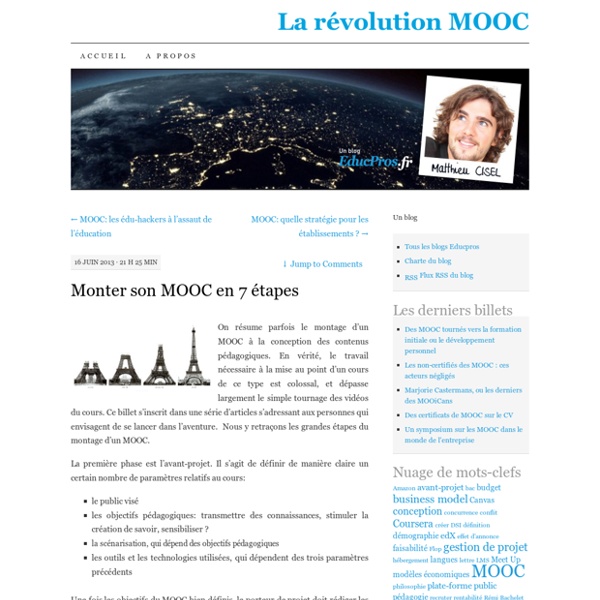



http://blog.educpros.fr/matthieu-cisel/2013/06/16/monter-son-mooc-en-7-etapes/
Related: Mooc • Innovation formation digitaleTop universities embrace MOOCs, but opinion is divided Elite universities, especially in America, are engaging enthusiastically in massive open online courses, or MOOCs. “They see opportunities for brand enhancement, pedagogic experimentation, recruitment and business model innovation,” says a review of MOOCs published by the UK government last week. But there are conflicting strands of opinion that are dividing the higher education community. Top institutions are providing brand, content, funding, staff, badging and policy support to MOOCs, and are reporting positively on MOOC experiments, “describing a process of maturing, expansion and deepening,” says the review. “There are dissident voices in the elite institutions, however, and the arguments they are assembling against MOOCs remain strong and vocal.”
International Institute for Environment and Development Participants at the CGIAR Climate Social Learning evidence gathering workshop, including IIED director of communications Liz Carlile (standing), at a workshop in June (Photo: CCAFS) "You are brave, trying to find common ground on this very challenging issue. But, how should you prove that social learning has a value?" said Barbara Van Mierlo, monitoring and evaluation expert at the end of the two-day social learning workshop in June. Activity - Moodle and Pedagogical Design Workshop An activity is a critical component for full achievement of learning outcomes. An activity provides students with a experience where meaning-making occurs in context of developing understanding, testing ideas and applying knowledge. The following diagram shows two key characteristics of an activity: Here are some examples that demonstrate what an activity may be:
MOOC Strategies of the Traditional LMS Providers The other evening, a close friend of ours was discussing a bad experience taking a MOOC on Coursera. Neither the content nor the format of the class was the problem; rather, it was the experience of Coursera’s online platform that left this person wishing that it was delivered via a traditional LMS instead. Since late 2012, there has been conversation about the overlap between the LMS and MOOC platform markets. While most of the edtech community continues to focus on the major MOOC platforms (e.g.: Coursera and EdX), each of the major LMS makers now has a solution for teaching MOOCs as well. Blackboard’s CourseSites has offered “open enrollment” courses since April 2012, the very month Coursera was founded, although the organization’s official press didn’t mention the acronym “MOOC” until early/mid 2013.
Coursera Raises $43m, LMS and MOOC Collision In Learning Platform Market -e-Literate Today Coursera announced their new round of fund raising, as reported at GigaOm: Just last year, online education startup Coursera raised $22 million in venture funding, but the Mountain View-based company is topping up its coffers once again.On Wednesday, the startup said it had raised $43 million in a Series B round of financing from an impressive and interesting group of investors, including education-centric investors GSV Capital and Learn Capital, well-known Russian investor Yuri Milner, the International Finance Corporation (which is the investment arm of the World Bank) and Laureate Education, a for-profit higher education provider formerly known as Sylvan Learning. Besides the size of the funding, what strikes me is that one of the emerging trends is that MOOCs are becoming more and more of a learning platform, adding many of the basic features of an LMS. When I pointed this out on Twitter, Burck Smith of StraighterLine got it right when he said “Sounds like an LMS”.
Calling an LMS a MOOC will only confuse the learner. Perhaps the Learning Management System (LMS) is not the best of terms to use when seeking to encourage learners to engage with e-learning courses; indeed when we first launched back in 1995 we described our tool as a Training Management System, a phrase still very much in use today. We realised some years ago that even this restricted the vision of what a fully developed training tool could achieve and rebranded our system as "Enable", giving it strong learner focus. In our view the term LMS is possibly guilty of having too much emphasis on management and not enough on learning. This is reflected in the fact that badly designed, or ‘tired’ LMSs are not overtly friendly or supportive to the learner as they embark upon the learning journey. Indeed, in an earlier blog piece we discussed the "Tired LMS" and the issue it poses. But what has all of this got to do with MOOCs?
Blackboard Pushes LMS Platforms for MOOC Use Distance Learning | News Blackboard Pushes LMS Platforms for MOOC Use By Dian Schaffhauser07/10/13 Blackboard's CourseSites is wooing additional institutions to its free learning management offering to run their massive open online courses (MOOCs). During the company's annual conference it announced that 15 colleges and universities will be trying out their MOOCs through the learning management system (LMS). Corporate MOOC vs. Your Existing Learning Systems We’re putting together a series of blog posts around the topic of corporate MOOCs. We hope this helps you understand and frame how a corporate MOOC could add value to your business. If you’re interested in learning more, be sure to read our other blogs about corporate MOOCs. You might be wondering why you should consider a corporate MOOC if you already have both training systems and collaboration systems in place. Our answer: “Exactly!”